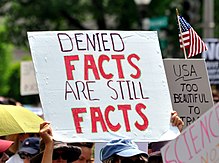Our website is made possible by displaying online advertisements to our visitors.
Please consider supporting us by disabling your ad blocker.
Denialism

In the psychology of human behavior, denialism is a person's choice to deny reality as a way to avoid believing in a psychologically uncomfortable truth.[1] Denialism is an essentially irrational action that withholds the validation of a historical experience or event when a person refuses to accept an empirically verifiable reality.[2]
In the sciences, denialism is the rejection of basic facts and concepts that are undisputed, well-supported parts of the scientific consensus on a subject, in favor of ideas that are radical, controversial, or fabricated.[3] The terms Holocaust denial and AIDS denialism describe the denial of the facts and the reality of the subject matters,[4] and the term climate change denial describes denial of the scientific consensus that the climate change of planet Earth is a real and occurring event primarily caused in geologically recent times by human activity.[5] The forms of denialism present the common feature of the person rejecting overwhelming evidence and trying to generate political controversy in attempts to deny the existence of consensus.[6][7]
The motivations and causes of denialism include religion, self-interest (economic, political, or financial), and defence mechanisms meant to protect the psyche of the denialist against mentally disturbing facts and ideas; such disturbance is called cognitive dissonance in psychology terms.[8][9]
- ^ Maslin 2009.
- ^ O'Shea 2008, p. 20.
- ^ Scudellari 2010.
- ^ Usages of Holocaust and AIDS denialism: Kim 2007; Cohen 2007; Smith & Novella 2007, p. e256; Watson 2006, p. 6; Nature Medicine's editor 2006, p. 369
- ^ Usages of global-warming denialism: Kennedy 2007, p. 425 Colquhoun 2009, p. b3658; Connelly 2007; Goodman 2007.
- ^ Diethelm, Pascal; McKee, Martin (January 1, 2009), "Denialism: what is it and how should scientists respond?", European Journal of Public Health, 19 (1): 2–4, doi:10.1093/eurpub/ckn139, PMID 19158101
- ^ McKee, Martin; Diethelm, Pascal (December 14, 2010), "How the growth of denialism undermines public health" (PDF), BMJ, 341: 1309–1311, doi:10.1136/bmj.c6950, PMID 21156741, S2CID 35789525
- ^ Hambling 2009.
- ^ Monbiot 2006.
Previous Page Next Page


